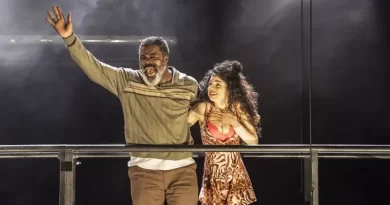“Every Brilliant Thing” at @sohoplace
Neil Dowden in the West End
10 August 2025
***
The cult hit play Every Brilliant Thing by Duncan Macmillan and Jonny Donahoe deals with serious issues of dysfunctional relationships, mental health, and suicide with engaging sensitivity and disarming humour. It has become an international phenomenon having been produced in over 60 countries since it was first staged at the Ludlow Fringe Festival in 2013. Strangely perhaps, this new production by Jeremy Herrin and Macmillan himself at @sohoplace is the first time it has been seen in the West End. But for this one-person show that relies so much on audience involvement, an intimate venue is essential – it has often been performed in small, non-theatre spaces – and the in-the-round format of @sohoplace suits it perfectly.

Photo credit: Helen Murray.
Although technically a monodrama – with just one actor on stage – it’s really a multi-person drama, not because the actor is playing lots of roles but because individual members of the audience have cameos as several characters. There is also more general audience participation. During this run there are five actors– Lenny Henry, Jonny Donahoe (who originated the role), Ambika Mod, Sue Perkins, and Minnie Driver – alternating as the protagonist who can be of any age, class, ethnicity, gender, or sexual identity. But the show will only work if they are able to get the audience engaged. First off, Henry – wearing a colourful Hawaiian shirt – with his huge experience as a stand-up comedian and social justice campaigner has no problems in setting a relaxed inclusive tone where everyone feels involved.
The show begins with his unnamed character (in the script the “Narrator”) looking back to when he was a seven-year-old boy and started to make a list of every brilliant thing when his mother ends up in hospital after she has attempted suicide – or as his father said “done something stupid”. His touching hope is that this will cheer his mum up.
But with The List expanding exponentially over succeeding years – starting with childish items like “water fights” and “staying up past your bedtime and being allowed to watch TV”, then more adolescent interests such as “the even-numbered Star Trek films” and “skinny-dipping” – it becomes clear that in reality this highly personal inventory acts as a life-affirming prop for his own ongoing mental health struggles.
We hear how he falls in love with a girl called Sam he meets in the university library and their wedding promises happiness, but the marriage doesn’t last. He has still not come to terms with the distress of being a child of a suicidal parent, so eventually seeks and finds some release in group therapy. Meanwhile The List continues: “freshly cut flowers”, “old people holding hands” …
Various audience members have been given slips of paper with items from The List which they read aloud when Henry randomly calls out their number – like a therapeutic Bingo. They may seem trivial at times, but many of these small moments of joy are greeted with collective murmurings of affectionate recognition, and they amass into a verbal tapestry of positivity.
Henry also prompts pre-selected audience members in role-play. He invites someone to come on stage to mime the part of a vet who gives his sickly pet dog – named “Ronnie Barker” – a euthanasia injection using a coat and a pen, which is the boy’s first encounter with death. Another man plays his emotionally repressed, inarticulate father who later actually has to improvise a wedding toast. Henry sits next to a woman (whose companion he has asked to vacate his seat) embodying Sam, feeding her a few lines and even encouraging her to get down on one knee and propose to him. Another woman acts as a sympathetic school counsellor who takes off a shoe so that she can use her stocking as a sock puppet whom Henry addresses. And someone else as a college lecturer reads the blurb on the back cover of Goethe’s The Sorrows of Young Werther which apparently inspired copycat suicide.
All these interactions are brilliantly managed by Henry and thoroughly enjoyed by the audience as a whole. As one of Britain’s best-loved entertainers, Henry – knighted for services to drama and charity, including co-founding Comic Relief – has become a national treasure with a high-spirited bonhomie that is hard to resist. His ability to ad lib and bounce off an audience is as sharp as ever. At one point he dances around to Curtis Mayfield’s “Move On Up”, then plays a few notes on a portable keyboard and sings part of Ray Charles’s “Drown in My Own Tears” while getting the audience to join in. The trouble is that these interactions are, arguably, too entertaining for a play that touches on such dark matters. Henry has of course become an accomplished dramatic theatre actor in recent years, but here his stand-up skills are foregrounded over quieter moments of poignancy.
Macmillan has made a conscious choice to treat emotionally difficult, indeed tragic, subject matter via a comic lens that doesn’t alienate people with miserable gravitas. The intention is laudable – though depression and trauma are much more openly discussed since the play was written – and some messages are as pertinent as ever – such as the language media should use/not use in reporting suicide cases. But the play doesn’t go very deep into the damaged psyche – we have no idea why the Narrator’s mother wants to kill herself, though she may be bipolar – and seems rather soft-centred, even sentimental at times. However, even if other social-issue plays by Macmillan, such as Lungs (about parenthood at a time of climate emergency) and People, Places and Things (about recovery from addiction), may be harder-hitting, seeing Every Brilliant Thing is certainly an uplifting experience.









